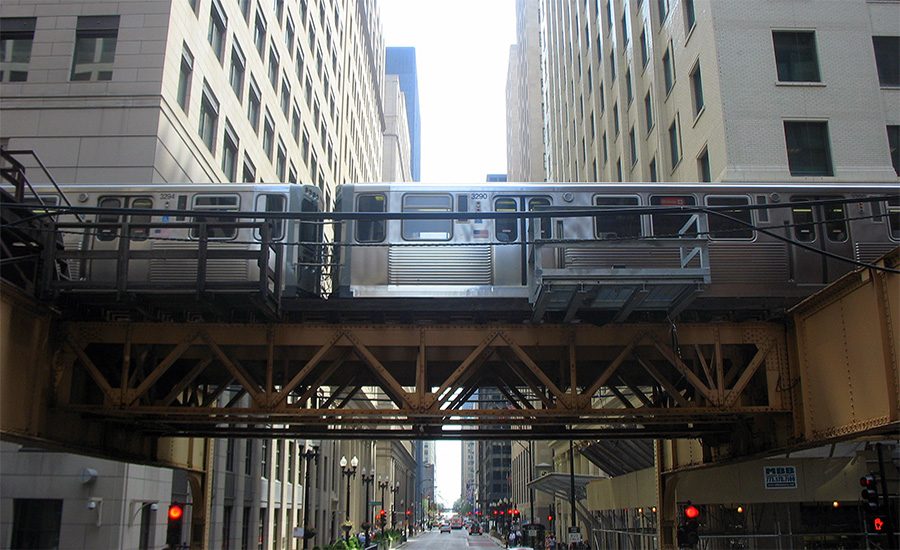Illinois Legislature Approves $1.5B Plan to Overhaul Transit Governance

Illinois lawmakers have approved a $1.5-billion plan to rescue the state’s transit agencies from a looming budget crisis and overhaul how they are governed.
Passed as Senate Bill 2111 in the early hours of Oct. 31, the measure would replace the Regional Transportation Authority with a new Northern Illinois Transit Authority overseeing CTA, Metra and Pace and now awaits Gov. JB Pritzker’s signature. The measure’s main provisions are to take effect June 1, 2026.
The plan redirects revenue streams to cover operating gaps projected to reach $230 million in 2026 and $834 million in 2027, while avoiding the statewide tax increases debated earlier this year.
According to the legislation, about $860 million will come from sales tax collected on fuel purchases, with another $200 million from interest earned on the state Road Fund.
Chicago-area residents will also see a regional sales tax increase and higher tolls, both tied to an expanded Illinois Tollway capital program that includes corridor modernization and bridge replacement work along I-294 and I-90.
Downstate agencies will receive $129 million annually—below the $200 million sought by rural operators—but the law marks the first time Illinois has separated stable operating funds from capital appropriations for transit systems.
Republicans criticized using Road Fund interest and motor-fuel tax receipts that traditionally support highway projects, warning of possible strain on road-maintenance accounts.
Rep. Ryan Spain (R-Peoria) said during House floor debate that the measure “creates a perverse incentive … to not diminish the balance of the Road Fund, not get projects out the door … but continue to build up big balances,” according to reporting by Capitol News Illinois.
Governance Shift Creates New Regional Authority
Governance changes are extensive. SB 2111 renames and rewrites the RTA statute as the Northern Illinois Transit Authority (NITA) Act, consolidating regional planning functions and authorizing universal fare payment and coordinated scheduling across agencies.
The new 20-member NITA board will include equal representation appointed by the Chicago mayor, the Cook County Board president, the governor and the collective group of collar-county leaders. The act also establishes an Office of Transit Safety and Experience and a dedicated law enforcement task force to oversee safety and customer service improvements.
“The Northern Illinois Transit Authority Act ensures that our region’s transit agencies have the resources and accountability needed to deliver safe, reliable, and equitable service,” said Sen. Ram Villivalam (D-Chicago), the bill’s sponsor. Rep. Eva-Dina Delgado (D-Chicago), who led House negotiations, called it “a pragmatic path to fiscal stability without cutting service.”
Gov. Pritzker praised the package as a step toward “a world-class transportation system” and signaled he will sign it.
CTA Acting President Nora Leerhsen said the measure means “no layoffs or service cuts” and will allow service additions and technology investments. The RTA described the passage as a “landmark moment” that provides stable funding and long-term governance reform.
The House approved the measure 72-33 around 2:15 a.m., followed by a 36-21 Senate vote about two hours later, capping more than a year of hearings and budget negotiations. Revenue transfers to NITA will begin in fiscal 2026, with structural consolidation and board appointments completed by June 1, 2026. The Illinois Dept. of Transportation and the state Comptroller confirmed that rules for revenue collection, auditing and distribution will be issued ahead of the board appointment deadline.
Stable Revenue Stream
The law’s steady-funding provisions are expected to keep regional capital programs on schedule and may accelerate deferred maintenance and accessibility work once operating deficits are eliminated, according to CTA, Metra and state documents reviewed by ENR.
CTA and Metra each list multibillion-dollar backlogs, including signal modernization, station upgrades, bridge rehabilitations and zero-emission bus fleet transitions. NITA will inherit the current five-year capital plans and has authority to revise project prioritization once it is seated.
Toll adjustments enacted within the same package will help finance a new Illinois Tollway capital program—projected at roughly $2.5 billion through 2030—for interchanges, express lane conversions and bridge renewals.
Toll increases of about 15% for passenger vehicles and 25% for trucks are expected to generate nearly $180 million annually, according to the state budget office. Those proceeds will remain within the Tollway’s capital account but are tied legislatively to the transit-stabilization compromise that allowed SB 2111 to pass.
While agencies and unions largely supported the measure, suburban and downstate lawmakers raised concerns that the new NITA board could centralize too much control in Chicago and that using Road Fund interest could constrain future highway spending.
Sen. Donald DeWitte (R-St. Charles) said, “We’re robbing Peter to pay Paul.” Villivalam countered that the Road Fund interest “has not been programmed for any construction project and will continue to accrue beyond what’s needed for maintenance.”
The legislation’s key implications are continuity of contracting and procurement schedules, a predictable operating base for agencies managing ongoing construction and a governance structure that integrates transit investment planning across multiple jurisdictions.
The post "Illinois Legislature Approves $1.5B Plan to Overhaul Transit Governance" appeared first on Consulting-Specifying Engineer

